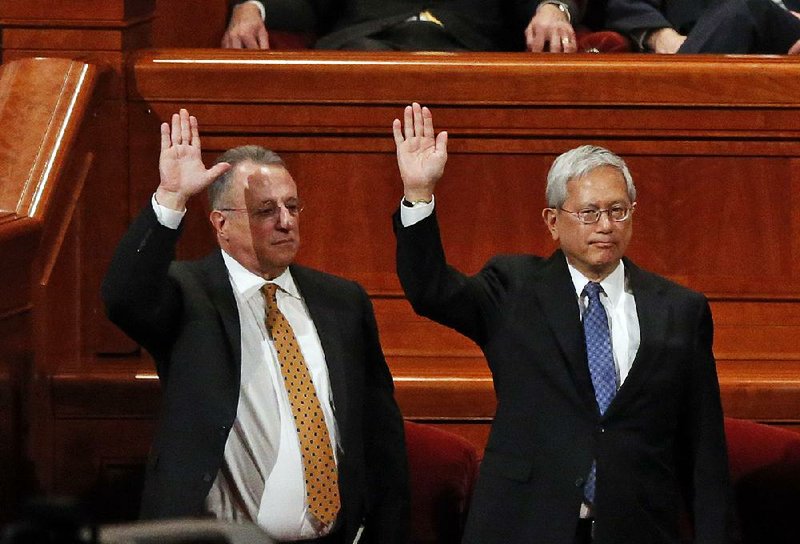SALT LAKE CITY -- The Mormon church made history and injected a bit of diversity into a previously all-white top leadership panel on Saturday by selecting the first-ever Latin-American apostle and the first-ever apostle of Asian ancestry.
The selections of Ulisses Soares of Brazil and Gerrit W. Gong, a Chinese-American, were announced during a twice-annual conference of The Church of Jesus Christ of Latter-day Saints in Salt Lake City. The choices triggered excitement among a contingent of Mormons who for years have been hoping for the faith's top leadership to be more representative of a religion that has more than half of its 16 million members outside the United States.
"It's a sign that the church is for everyone," said Guilherme De Castro, a 37-year-old Mormon from Brazil who was in attendance for the announcement. "It doesn't matter where you are from or the way you look."
The selections come during a conference happening as faith grapples with heightened scrutiny about its handling of sexual abuse reports and one-on-one interviews between local lay leaders and youth. In the Saturday morning session of the two-day conference, Mormon leaders didn't touch that topic.
It is the first conference presided over by new church President Russell Nelson. His choices for the two open leadership spots sparked hope that the 93-year-old former heart surgeon will focus on the globalization of the faith. He is set to embark on a trip this month to visit eight cities in Europe, Africa and Asia, including Hong Kong.
The choices mark the strongest statement in favor of global diversity by senior church leadership since 1978 when the church lifted a ban on black men in the lay clergy, allowing the church to spread to Brazil, Africa and elsewhere, said Mormon scholar Patrick Mason, associate professor of religion at Claremont Graduate University in California.
The announcement sparked tweets and social media posts, some by Mormons who said they never thought they would see the day.
Soares and Gong join a panel called the Quorum of the Twelve Apostles that, before Saturday, was made up entirely of white men from the U.S. with the exception of one German, Dieter Uchtdorf.
The all-male panel sits below Nelson and his two counselors and helps set church policy and oversees the faith's business interests. The new appointees start as junior members, but they could someday become church president because the group's longest-tenured member ascends to president when the current one dies.
Like the previous 12 men chosen for the panel, Soares and Gong were serving in a lower-level leadership called the Quorum of the Seventy.
The 59-year-old Soares was an accountant and auditor for multinational corporations in Brazil before joining church leadership, according to a church biography. He was born in Sao Paulo, Brazil.
Gong, 64, worked for the U.S. State Department, the Washington, D.C.-based Center for Strategic and International Studies and Mormon-owned Brigham Young University before being selected for the lower-tier church leadership panel. He was born in Redwood City, Calif. His grandparents immigrated to the United States from China.
The new selections reflect the "rising focus of church leadership on the world outside the United States, where the church is growing most rapidly," said Mormon scholar Matthew Bowman, an associate professor of history at Henderson State University in Arkadelphia.
The diversity in leadership should help broaden conversations about race and ethnicity and add new prisms through which the gospel is viewed, said Ignacio Garcia, a professor of Western and Hispanic history at Brigham Young University.
"Those are the ones that are growing: black and brown and Asian," Garcia said. "That's the future of the church."
A Section on 04/01/2018

